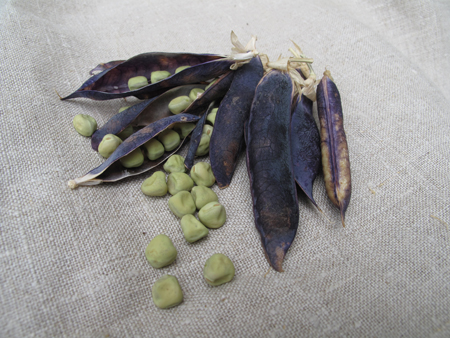Friday, September 27, 2013

Beautiful Blue Pod Capucijner (Pisum sativum arvense, var. ‘Blue Pod Capucjiner’) seedpods and seeds. All photographs by the author
How many of you gardeners out there take the time to save your garden seed? The allure of planting seeds in the spring is easy to understand, but do you linger over drying seedpods later in the season, waiting to harvest next year’s generation? Seed saving may seem like an onerous counterpart to seed sowing, but the task is endlessly rewarding. It’s not just about securing a free source of new plants for the following year or two; there are other benefits to reap, so to speak. By selecting seed from among the garden’s most healthy specimens you promote added vigor in subsequent generations of plants. You get to witness the often overlooked beauty of a plant engaged in seed production. And, really, is there anything more satisfying than sowing the seed you collected from your own garden? For the seed-saving gardener, it doesn???t get much better than that.
Read more »
Tags: Blue Pod Capucijner, castor bean, corn poppy, Datura, Datura metel, Glaucium flavum, henbane, horned poppy, Mandragora officinarum, mandrake, Ricinus, sea poppy, seed, seedhead, seedpod, seeds, stavesacre
Posted in Botany for Gardeners, Gardening at The Cloisters | Comments (3)
Monday, October 20, 2008

Above: Stems and leaves of Ricinus communis
Widely naturalized throughout the tropics, castor bean (Ricinus communis) is??commonly grown as an ornamental annual in??American and European gardens, but it is also??a??crop plant of worldwide economic importance.??In a tropical environment, the castor bean attains the status of a thirty-foot tree. Even in temperate zones, it can reach a height of fifteen feet in a single season. An ancient medicinal plant of African origin,??castor bean??was employed by the Egyptians as a cathartic and is among the plant remedies??found??in the Ebers Papyrus. ??Like other members of the??Spurge family (Euphorbiaceae), the plant is poisonous. Dioscorides, writing in the first century, refers to the??plant??by its Egyptian name, kiki, as well as its Greek and Roman names: kroton and ricinus.?? The last two names derive from the Greek and Latin words for “tick,”?? because of a fancied resemblance of the??seed to the parasite. Read more »
Tags: castor bean, Castor ricinus, medicinal plant, poisonous plant
Posted in Medicinal Plants | Comments (0)


